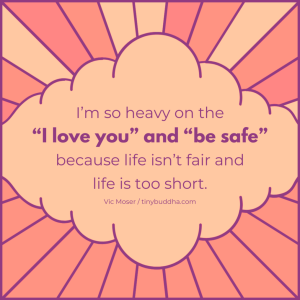
“The last of one’s freedoms is to choose one’s attitude in any given circumstance.” ~Viktor E. Frankl
For my livelihood, I lead workshops on how to let go of stress and experience deeper happiness. My occupation makes my occasional meltdowns all the more embarrassing. Fortunately, a meltdown I had last year led me to a question that completely changed how I view difficult situations in my life.
As I was checking in at the airport a few months ago, I was told I did not have a ticket for my cross-country flight. Fortunately, I had my confirmation number with me—which I promptly gave to the agent.
“I’m sorry,” she said. “Although you have a confirmation number, you’re not in our system. You can’t board this flight.”
A wave of self-pity, anger, and anxiety seared through my body. Fifty people were expecting me in New York City the next morning to talk about how to be happier. Yet, here I was fully stressed out and making this situation mean I’m an unlucky hypocrite.
I asked the ticket agent if there were any more tickets available.
“Yes,” she said enthusiastically as she typed away on her keyboard.
“Okay,” I thought. “Maybe it’s not going to be such a bad day after all. I’ve been saved.”
She continued, “But if you buy the same ticket you had before, instead of $600 round trip, it will cost you $3200.”
“I was right the first time,” I thought. “This means I’ve been totally screwed.”
I needed to get to New York ASAP, so I reluctantly, angrily, and self-righteously bought the stupid ticket.
The irony of the situation did not escape me. Here I was feeling self-pity and totally stressed out while buying a ticket to lead a workshop on happiness. The universe definitely has a sense of humor.
For a long time I’ve known I can choose my attitude and the meaning I give the events in my life. Yet, there is a difference between knowing something intellectually and knowing it when the crap hits the fan.
Fortunately, the “ticket fiasco” I went through that day led me to create a simple question I can ask myself that has greatly impacted my daily life.
To make a long story short, I got to New York on time and led the workshop the next morning. That night I talked to the folks at United Air Lines and they confessed that my not “being in the system” was totally their fault.
In fact, they decided to refund the $3200 fare I had paid that day plus what I had previously paid for my ticket.
I actually ended up making $600. Now I was feeling like life is a bowl of cherries and everything works out for the best. It seemed like I had gone through a lot of bad feelings for nothing.
Then it hit me. I realized I often get “worked up” about things that frequently end up working out for the best. I wondered if there was a way to short-circuit this process so I didn’t spend so much time being unnecessarily stressed.
As I pondered this situation, I wondered, “What question could I ask myself that would help me when faced with difficult situations?” I saw that when things occur that I don’t like, I’m basically asking myself “What could be bad about this?”
Since I ask that question, my brain feels obliged to give me many reasons why something sucks.
So I wondered what it would be like to ask myself, “What could (potentially) be good about this?” when facing challenging situations.
In retrospect, I realized that had I asked this question when finding out I had no ticket, I might have come up with a couple of good answers.
I might have guessed it would ultimately lead to a good story, or a new technique—or even a refund beyond what I had paid. Of course, that’s what ended up happening, but it would have saved me a lot of grief had I imagined that outcome while in the ticket line.
Of course, no one knows what the future holds. Yet, it seems we habitually make the challenging events of our life mean things that lead to bad feelings.
If you’re going to make up things about the future, you may as well come up with a meaning that empowers you—rather than stresses you out.
For better or worse, over the next few weeks I had plenty of opportunities to practice this simple method. For example, when my tax bill was unexpectedly high, I asked, “What could be good about this?”
That answer was easy. It could mean I’m making more money than ever before; it could mean I get to help contribute to the government so they can provide services to people less fortunate than I.
When I got sick, I asked, “What could potentially be good about this?”
Begrudgingly I answered, “It’s a helpful wake up reminder that I need to take my vitamins and not work too many hours.” Though still sick, I immediately felt better now that I had attached an empowering meaning to my illness.
The ability to quickly create a positive meaning to the events in our life is a great aid to being happy. Yet, this is the exact opposite of what our mind normally does. We normally create negative, disempowering meanings whenever things seemingly “go wrong.”
The question, “What could (potentially) be good about this?” is a simple way to change how we interpret each situation in our life. So when you get in an argument with your partner, you can see that disagreement as a doorway to deeper intimacy—rather than a doorway to depression.
When the argument is over, you don’t really know what the future holds. You may as well create a meaning that empowers you. Through such empowerment, you’ll feel better and you’ll be more likely to act in a helpful manner.
Nowadays, I frequently ask myself, “What could be good about this?” I always come up with at least two answers, even if I don’t believe them. I find that it immediately makes me feel better—and more empowered.
Instead of life feeling like a battle I need to put up with, it feels like I’m being given useful challenges that will eventually lead to a happy ending. It’s a much better way to live than being the victim of a mind that always delivers bad news.
Photo by wesleynitsckie
About Jonathan Robinson
Jonathan Robinson is the author of 12 books, a frequent guest on Oprah, and the co-host of the popular podcast Awareness Explorers. (for more info: AwarenessExplorers.com)













 Though I run this site, it is not mine. It's ours. It's not about me. It's about us. Your stories and your wisdom are just as meaningful as mine.
Though I run this site, it is not mine. It's ours. It's not about me. It's about us. Your stories and your wisdom are just as meaningful as mine.